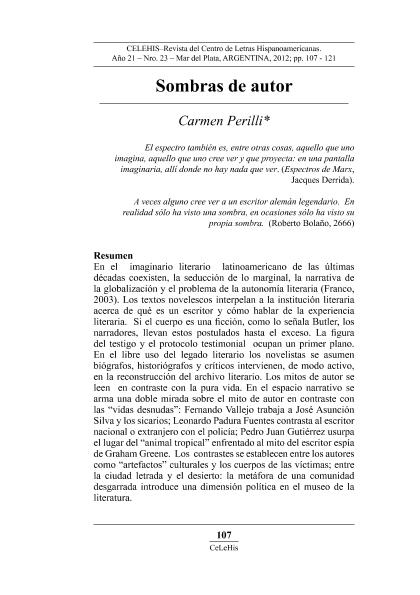Mostrar el registro sencillo del ítem
dc.contributor.author
Perilli, Carmen Noemi

dc.date.available
2018-09-27T21:11:10Z
dc.date.issued
2012-10
dc.identifier.citation
Perilli, Carmen Noemi; Sombras de Autor; Centro de Letras Hispanoaméricanas; Celehis; 23; 10-2012; 107-121
dc.identifier.issn
2313-9463
dc.identifier.uri
http://hdl.handle.net/11336/61139
dc.description.abstract
En el imaginario literario latinoamericano de las últimas bdécadas coexisten, la seducción de lo marginal, la narrativa de la globalización y el problema de la autonomía literaria (Franco, 2003). Los textos novelescos interpelan a la institución literaria acerca de qué es un escritor y cómo hablar de la experiencia literaria. Si el cuerpo es una ficción, como lo señala Butler, los narradores, llevan estos postulados hasta el exceso. La figura del testigo y el protocolo testimonial ocupan un primer plano. En el libre uso del legado literario los novelistas se asumen biógrafos, historiógrafos y críticos intervienen, de modo activo, en la reconstrucción del archivo literario. Los mitos de autor se leen en contraste con la pura vida. En el espacio narrativo se arma una doble mirada sobre el mito de autor en contraste con las “vidas desnudas”: Fernando Vallejo trabaja a José Asunción Silva y los sicarios; Leonardo Padura Fuentes contrasta al escritor nacional o extranjero con el policía; Pedro Juan Gutiérrez usurpa el lugar del “animal tropical” enfrentado al mito del escritor espía de Graham Greene. Los contrastes se establecen entre los autores como “artefactos” culturales y los cuerpos de las víctimas; entre la ciudad letrada y el desierto: la metáfora de una comunidad desgarrada introduce una dimensión política en el museo de la literatura.
dc.description.abstract
Coexistent in the Latin American literary imagination of the last decades are the allure of the marginal, the narrative of the globalization, and the problem of literary autonomy (Franco, 2003). The texts of the novels confront the literary institution with questions about what a writer is and how to speak of the literary experience. If the body is a fiction, as Butler claims, narrators take this postulate to the extreme. The figure of the witness and the testimonial protocols come to the fore. In a free use of the literary heritage, the novelists appear as biographers, and both historiographers and critics participate actively in teh reconstruction of the literary archive. The myths of the author are read in contrast to real life. In the narrative space, a double gaze operates simultaneously on the myth of the author in contrast to the “naked lives”: Fernando Vallejo deals with both José Asunción Silva and the “sicarios”; Leonardo Padura Fuentes contrasts the national or foreign writer to the policeman; Pedro Juan Gutiérrez usurps the place of the “tropical animal” against Graham Greene’s myth of the spy writer. The contrasts are established between the authors as cultural “artifacts” and the victims’ bodies; between the literate city and the desert: the metaphor of a torn community introduces a political dimension in the museum of literature.
dc.format
application/pdf
dc.language.iso
spa
dc.publisher
Centro de Letras Hispanoaméricanas
dc.rights
info:eu-repo/semantics/openAccess
dc.rights.uri
https://creativecommons.org/licenses/by-nc-sa/2.5/ar/
dc.subject
Sombras
dc.subject
Autor
dc.subject
Memoria
dc.subject
Literatura
dc.subject.classification
Estudios Generales del Lenguaje

dc.subject.classification
Lengua y Literatura

dc.subject.classification
HUMANIDADES

dc.title
Sombras de Autor
dc.type
info:eu-repo/semantics/article
dc.type
info:ar-repo/semantics/artículo
dc.type
info:eu-repo/semantics/publishedVersion
dc.date.updated
2018-07-11T15:09:27Z
dc.journal.number
23
dc.journal.pagination
107-121
dc.journal.pais
Argentina

dc.journal.ciudad
Mar del Plata
dc.description.fil
Fil: Perilli, Carmen Noemi. Consejo Nacional de Investigaciones Científicas y Técnicas. Centro Científico Tecnológico Conicet - Tucumán. Instituto de Investigaciones sobre el Lenguaje y la Cultura. Universidad Nacional de Tucumán. Facultad de Filosofía y Letras. Cátedra de Literatura Argentina. Instituto de Investigaciones sobre el Lenguaje y la Cultura; Argentina
dc.journal.title
Celehis
dc.relation.alternativeid
info:eu-repo/semantics/altIdentifier/url/https://fh.mdp.edu.ar/revistas/index.php/celehis/article/view/112
Archivos asociados
